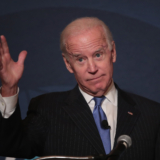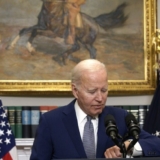Ukraine’s failed counteroffensive and the drying up of American funds.
In the U.S. Congress, a desperate plea echoes through the corridors as Ukraine President Volodymyr Zelenskyy prepares to address U.S. senators. This is no ordinary diplomatic engagement; it’s a stark cry for attention. The Biden admin is frantically racing against time to secure a staggering $106 billion for conflicts in Ukraine, Israel, and other critical security needs.
Senate Majority Leader Chuck Schumer has emphasized the urgency surrounding Zelenskyy’s imminent address, making it clear that this isn’t business as usual. The Biden admin, in a classified briefing, has rung the alarm bells, warning of the imminent collapse of Kyiv’s war effort unless Congress swiftly approves the requested military and economic assistance.
In a blunt and grim letter to House and Senate leaders, Office of Management and Budget Director Shalanda Young left no room for ambiguity. She warned that the U.S. is teetering on the edge of exhausting funds to support Ukraine’s defense. The collapse of Ukraine’s economy, she cautioned, would be a fatal blow to its counteroffensive.
Biden’s proposed aid package, however, faces skepticism on Capitol Hill. The allocated $106 billion for Ukraine, Israel, and other critical needs is ensnared in a political crossfire, with Republicans demanding U.S.-Mexico border policy changes as a precondition for assistance. This political maneuvering not only jeopardizes the lifeline Ukraine desperately needs but raises unsettling questions about priorities.
Despite a previous allocation of $111 billion by Congress to assist Ukraine, the funds have been depleted, leaving the nation on the precipice. The proposed $61 billion for Ukraine, primarily for purchasing weapons from the U.S., stands as a last-ditch effort to stave off disaster.
Adding another layer of complexity, the Israel-Hamas conflict further muddies the waters. The GOP-controlled House passed a standalone assistance package for Israel, yet Biden’s allies in Congress demand conditions. Senator Bernie Sanders, in labeling it “irresponsible” to send military aid without commitments from Israel to reduce civilian casualties and allow aid to Gaza.
As negotiations falter and political agendas clash, lingering questions cast a pall over this unfolding drama. Is Ukraine’s faltering counteroffensive the reason for the abrupt drying up of American funds, or has Zelenskyy fallen out of favor with the U.S. administration? Shalanda Young’s stark message echoes through the corridors of power – “We are out of money to support Ukraine in this fight.”
The choices facing America are stark, and the consequences are dire. The apparent abandonment of Ukraine not only raises unprecedented questions but also shines a harsh light on the perplexing selective allocation of funds. How is it that the U.S. can readily fund Israel’s military pursuits but seems hesitant when it comes to standing by Ukraine in its hour of need? The silence from Washington speaks volumes.






